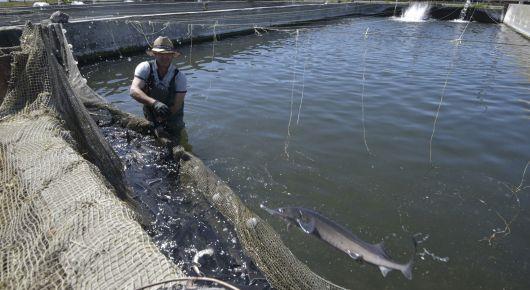Conservation of inland fisheries, aquaculture necessary for healthy diets in Europe and Central Asia

Fish from inland rivers and lakes, whether wild or raised through freshwater aquaculture, have the potential to make significant contributions to healthy diets and sustainable food supplies in Europe. This is the main message of two important meetings of FAO’s European Inland Fisheries and Aquaculture Advisory Commission (EIFAAC), being held this week in Germany.
Members will discuss the development of the Commission’s work plan and strategy at the Thirtieth Session of EIFAAC, to be held 11–13 September in Dresden, hosted by the Government of Germany. Preceding the session will be the EIFAAC Symposium, to be held from 9–11 September, which focuses on food safety, certification, diadromous fish, and conservation conflicts in European freshwater rivers and lakes.
“Despite the fact that 40 percent of global fish production for human consumption is produced using inland resources, European and Central Asian countries continue to lag behind in the development of freshwater for fish production,” said Victoria Chomo, General Secretary of the Commission, “as competing uses such as hydroelectric dams, crop irrigation and dredging have negative impacts on inland fisheries habitats and ecosystem biodiversity.”
With completion of some targets of the 2030 Agenda for Sustainable Development due in 2020, the EIFAAC session and symposium offer an important forum for regional research institutions to gather and share scientific findings that can drive evidence-based policies for more sustainable food production in Europe.
EIFAAC’s regional projects have focused on such topics as the welfare of fishes in aquaculture, the threat of aquatic invasive species in Europe, sustainable management actions on the cormorant population, standards for fish pass monitoring and others, addressing the overarching challenges faced by small-scale commercial fishers, angler associations, and fish farmers on the European continent. Among the Commission’s aims is to provide advice and recommendations, encourage broad participation and communication, and deliver relevant scientific research for the long-term health of inland fisheries and aquaculture in the region.
As a recent FAO report on world aquatic genetic resources notes, aquaculture is lagging far behind terrestrial agriculture – both crops and livestock – in terms of the characterization, domestication and improvement of genetic resources for food production. This is especially true in Europe, which lags behind Asia and Africa in freshwater aquaculture development. The FAO report concludes that there are opportunities to enhance sustainable aquaculture production through the strategic management and development of some of the 550-plus species used in aquaculture worldwide.
“Ensuring healthy diets from increased fish consumption in Europe and Central Asia and management of inland aquatic resources, following the ecosystem and climate-smart approaches of FAO, are the ultimate outcomes of EIFAAC research and can significantly contribute to the achievement of the 2030 Agenda,” Chomo said.
9 September 2019, Dresden, Germany
